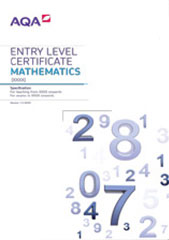3.5 Component 5: the calendar and time
This content aims to develop the student’s understanding and use of 12 and 24-hour time and of calendars and timetables in everyday use.
Students will learn how to read digital and analogue clocks, including using roman numerals and learn how to convert between 12 and 24-hour times. They will also learn about days, weeks and months of the year.
Procedures for making and recording assessments
Class work assessed by the teacher in response to the outcomes in the table, or assessed by an externally set assignment.
Outcomes to be accredited
In successfully completing this component, students will have demonstrated the ability to:
Entry 1
|
Outcomes |
Notes/examples |
GCSE reference |
|---|---|---|
|
1.1 Know the days of the week and their order |
Key words are today, yesterday, tomorrow, now, before, after, next What is the day before Tuesday? |
|
|
1.2 Read the time to the hour or half hour on an analogue clock and draw the hands on a clock to show these times |
||
|
1.3 Order familiar events |
Put in order: eat dinner, go to school, wake up, leave school, have breakfast |
Entry 2
|
Outcomes |
Notes/examples |
GCSE reference |
|---|---|---|
|
2.1 Know the seasons and months and their order |
What is the season after summer? |
|
|
2.2 Know that 1 week = 7 days; 1 day = 24 hours; 1 hour = 60 minutes; 1 minute = 60 seconds |
||
|
2.3 Read the time displayed on an analogue or 12 hour digital clock in hours, half hours and quarter hours and draw the hands on a clock or the digital display to represent these times |
Students should be able to convert ‘quarter past eight’ to 8.15 and draw the hands on a clock to show this time |
|
|
2.4 Read the time to the nearest five minutes on an analogue clock, draw the hands on a clock to show the time, and read any time on a digital clock |
||
|
2.5 Find the difference between two times given in hours, half hours and quarter hours. |
How many minutes are there from 2.45 to 3.15? |
N13, G14 |
Entry 3
|
Outcomes |
Notes/examples |
GCSE reference |
|---|---|---|
|
3.1 Solve problems involving time |
Mohammed got on the bus at 10 o’clock. His journey lasted 45 minutes. What time did he get off the bus? |
|
|
3.2 Know that there are 365 days in a year, 366 days in a leap year, 12 months in a year and 52 full weeks in a year |
||
|
3.3 Use a calendar and write the date correctly (day/month/year) |
Given a calendar, What is the date of the first Friday in January? How many days are there in October? |
|
|
3.4 Tell and write the time from an analogue clock, including using Roman numerals from I to XII |
||
|
3.5 Understand and use the 12-hour and 24-hour clock systems and convert from one system to the other |
Key words are noon, morning, afternoon, evening and midnight Write 2pm in the 24 hour clock system |
|
|
3.6 Convert between hours, minutes and seconds |
Change 250 minutes into hours and minutes |
N13, R1, G14 |
|
3.7 Add up to three lengths of time given in minutes and hours |
Shown part of a TV guide, How long do ‘Emmerdale, Coronation Street and Britain’s Got Talent last altogether? |
N2, N13, G14 |
